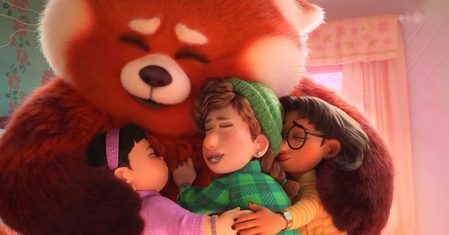SUMMARY
This is AI generated summarization, which may have errors. For context, always refer to the full article.
![[New School] Honor thyself: On ‘Turning Red’ and growing up an unica hija](https://www.rappler.com/tachyon/2020/08/mother-languages.jpg)
We are not rich, but my mother made sure I grew up sheltered, protected, and loved. As an only girl and her only child, I understood where she was coming from. So in return, I built my world around her and carefully followed her moves.
There is nothing wrong with that at first, until you reach a certain age and realize that you were walking on eggshells and feeling guilty for having your own mind.
When Disney released Turning Red earlier this year, I couldn’t help but recognize a similar arc in my life. Like Mei, the heroine, I was constantly torn between following my mother’s “moves” and going through the chaos of adolescence.
In the movie, a red panda comes out of 13-year-old Mei whenever she gets “too much.” Her protective, if not slightly overbearing, mother, Ming, is almost always on her side, guiding her every move. When news of the red panda breaks out, Ming is quick to decide to eliminate it at once.
I saw the red panda as the symbol of Mei’s coming of age and the changes that came with it. I have mixed feelings about my own coming of age, but I might’ve been wrong in considering my “turning red” as something terrible, when truly, I was just becoming my own person.
“Growing up is a beast,” the movie says, but it doesn’t have to be.
My turning red
I remember so many instances in my childhood that shaped me into the person I am today. As someone from a close-knit family, I felt responsible for bringing pride and honor to our home.
Like Mei, I’ve always been an achiever at school. My mother was a constant attendee of school recognitions by the end of the year. I always tried to give a good impression, ace exams, and be on my best behavior. I followed the rules and focused well on my studies. At one point, it was all that I had. I joined numerous organizations, became active in extracurricular activities, and made sure I never got a grade below 90. I was so invested that I made it my whole personality.
The more I did well in school, the more I felt validated because my mother was proud of me. I wanted her and others to see me as a good student, and there was constant pressure to prove myself. It didn’t matter that I got compared a lot; I took it as a challenge. But as a result, I never learned to fail with grace. I was always so hard on myself, which turned out to be counterproductive most of the time.
The expectations rose over the years, and I toiled to keep up. College was a different experience, though, as it was harder to impress and get good marks with the same efforts. My last memory of in-person school was a few days before the pandemic was declared in March 2020. An advertising pitch for one of our subjects didn’t get approved, and I remember going home, feeling down, and crying because I was disappointed in myself.
It didn’t help that my mom was a teacher, and that I grew up in academic circles. I felt that too many eyes were watching my every move. I felt the need to always do the right thing and constantly live up to their expectations. But that’s the thing about getting your self-worth from the highs. When you fall, you feel lost.
It also came to a point where I got interested in boys. Amid changes in my body, I also developed crushes in elementary and high school. I felt the need to hide it at first because it was new to my family and me. When my mother discovered that I was already exploring relationships, she suddenly imposed strict rules, and I didn’t know what to do.
There was an inner confusion and a constant external pressure that, at one point, I saw love as a weakness. I began thinking that wanting someone was something to be embarrassed about. For a long time, I felt the need to be less showy about my feelings and affection for boys (or anyone) because I was taught it was wrong for girls to do that.
To be fair, healthy warnings are important, especially for the younger ones. Some bad people take advantage of whoever they consider vulnerable, so listening is not necessarily wrong. When I had my first real heartbreak, my mother was as hurt as I was as she picked me up and took care of me. I finally understood why she told me not to take love so seriously and to leave some to myself. I couldn’t thank her enough for that.
But now, at 22, I struggle at handling relationships because life, as unprecedented as it can be, has taught me that there are many forms and faces to love that exist, contrary to the traditional concepts I grew up with. Maybe I would have a healthier approach if it was communicated early on and not considered taboo.
I also wasn’t allowed to spend my time as I pleased. I had to go straight home from school and spend weekends at home. Luckily, I had my extracurricular activities to keep me away. The downside? I was rarely allowed to go out if not for school-related activities. Even hanging out with my friends proved difficult because I wasn’t easily allowed to attend sleepovers or trips. It was even more challenging during dates.
As a result, I never learned to be independent. I had limited chances to make decisions for myself and live with the consequences. I understand the need to shelter and protect, but a girl needs just the right distance to explore and grow into her own person.
The Filipino upbringing
As a little girl, I was taught to be prim and proper. To speak softly, laugh timidly, dress in clean, decent clothes, and never wear pieces that attract too much attention and reveal my body parts. But as a young adult, I struggled with body image and how I carried myself regardless of what I wore. I never learned to have fun and express myself with my clothes because I couldn’t dare to be different. Instead, I learned to nitpick and obsess about how put together I looked.
During playtime, I would play by myself most of the time. I would see my cousins run around, but I would end up either role-playing as a teacher, playing with my kitchen set, or playing house. I remember reading books in my free time and contemplating a lot. Don’t get me wrong, I enjoyed my own company, but I often wondered about the person I would have become if I had gotten used to socializing with other kids.
Like Mei, my grandmother also had a big role in raising me. Back in elementary, my Lala (grandmother) would always braid my hair and style it in different ways every day before going to school. I was born with naturally curly hair – the only one in our family.
She had the best intentions, but in hindsight, I think that was one of the first instances when I made myself small. I conditioned myself into thinking my hair needed to be tamed because it was messy and unacceptable otherwise. I lost confidence in what made me unique from others.
I was also taught the classic po and opo and the pagmamano to the elderly. I followed it religiously, but when I grew tired of doing the act (with strangers), especially in the pandemic, Lala would look at me with disappointment and complain about losing my manners.
As a Catholic, I felt obliged to go to church even when I had growing questions about how it worked. Lala and my mother took it personally when I stopped going and attended another church’s praise and worship.
It was in high school when I really learned to defend myself, or as they like to call it, talk back. It is frowned upon when a child speaks during confrontations or arguments, but I’ve always had a reason, and I wanted it known. To my frustration, there was no space for that.
My disagreements would be reduced to merely talking back out of spite. And even when I had a point, I was still on the wrong side because I was younger and had to show respect. I see the importance of discipline, but my silence during those years made me take a lot of bad behavior from people as a grownup. I got scared of setting boundaries for fear of making people angry. I would sacrifice my comfort to avoid confrontations, and I always prioritized showing respect even when people didn’t deserve it.
Coming to terms with it
I could further unpack the many layers of my life, but that would make for a very long piece. I never really had a rebellious phase, but I often wonder about the person I would’ve become if I didn’t try so hard to be the good girl my family wanted me to be. I always questioned my every move – my very being – because, for a long time, I believed that their honor came before mine. I was walking on eggshells because I thought any wrong move would reflect poorly on them.
Perhaps life would feel whole if I dared to break outside my comfort zone. But would I have been a good person if I tried to live outside their expectations? Would I have lost my way if I let the “red panda” out too much? These questions haunt me to this day.
I cannot be more thankful for a family who raised me to the best of their abilities, but they became so involved that I grew up not knowing who I am. They eventually became more open and accepting of my less conservative ways, but there was a lot of guilt and microaggression as we came to terms with my turning red.
I understand that I was raised by different generations of women subjected to the same or even worse conditions growing up. It wasn’t their fault they were conditioned a certain way and unconsciously passed it on, but the fault would be mine if I let it go on.
That my experiences are not isolated and that many across the country (and the world, as portrayed in Turning Red) have gone through similar, if not the same, experiences is enough reason to stop the pattern. Little boys and girls deserve an environment where they can explore their personalities without fear of being too different or too much.
I found peace in believing that there was so much more to my womanhood than society’s standards. Just because I don’t always fit into the good girl mold doesn’t mean I am worth any less. Just because I falter doesn’t mean I am weak. Just because I don’t always follow the rules doesn’t mean I’m a terrible person.
It can be hard under a system that enables certain inequalities. But it’s vital for me to believe that to find my power again in the dark, I need to be kinder and build a healthier space for myself and the generations to come. – Rappler.com
Maria Leonor Euna L. Regaspi is a 4th year BA Communication student at Bicol University and a Life & Style and Entertainment intern at Rappler. Aside from writing, she loves to make art, advocate, read books, and watch movies and TV shows. You can reach her via email at marialeonoreunalontayao.regaspi@bicol-u.edu.ph.
Add a comment
How does this make you feel?
![[OPINION] ‘Turning Red,’ and growing up beyond my mom’s shadow](https://www.rappler.com/tachyon/2022/03/imho.jpg?fit=449%2C449)

![[Two Pronged] My friend has an abusive partner. What can I do?](https://www.rappler.com/tachyon/2024/04/limits-of-friendships-april-16-2024.jpg?resize=257%2C257&crop=414px%2C0px%2C1080px%2C1080px)
![[Two Pronged] Am I bi-curious? A lesbian? How do I explore these feelings?](https://www.rappler.com/tachyon/2024/04/two-pronged-bisexuality.jpg?resize=257%2C257&crop=283px%2C0px%2C720px%2C720px)
![[Two Pronged] Will watching porn and masturbating affect my future relationships?](https://www.rappler.com/tachyon/2024/03/two-pronged-single-female-30-year-old-virgin-porn.jpg?resize=257%2C257&crop=235px%2C0px%2C720px%2C720px)
![[WATCH] Spoil me but respect me: A sugar baby’s story](https://www.rappler.com/tachyon/2024/03/titlecard-03.jpg?resize=257%2C257&crop_strategy=attention)

![[Two Pronged] I think I’m bipolar – can I handle it without medication?](https://www.rappler.com/tachyon/2024/03/two-pronged-BiPolar-Disorder-without-meds.jpg?resize=257%2C257&crop=250px%2C0px%2C720px%2C720px)



![[Bodymind] Rising above adverse country experiences under Duterte](https://www.rappler.com/tachyon/2024/03/duterte-country-experiences-mar-15-2024-2.jpg?resize=257%2C257&crop=305px%2C0px%2C720px%2C720px)
There are no comments yet. Add your comment to start the conversation.